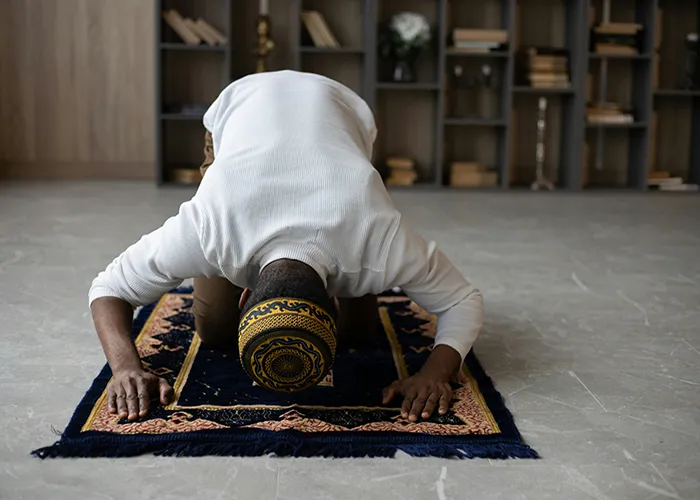Fatwa Panel of the Week – Volume02 Issue28
Rulings Related to the Clothing:
The rules related to the clothing, according to the fatwas of the Grand Religious Authorities:
Grand Ayatollah Khamenei, Grand Ayatollah Sistani, and Grand Ayatollah Makarem Shirazi (may their eminence be preserved):
Conditions for the Clothing of a Person Performing Prayer
| Ayatollah Khamenei | Ayatollah Sistani | Ayatollah Makarem Shirazi |
| The clothing of the person performing prayer must meet the following conditions:
1. It must be clean (tāhir). 2. It must be lawfully owned and used (mubāḥ). 3. It must not be made from parts of a dead animal (carrion). 4. It must not be made from parts of an animal whose meat is forbidden to eat. 5. A man’s clothing must not be made of gold or pure silk. |
Same as Ayatollah Khamenei’s Fatwa.
|
Same as Ayatollah Khamenei’s Fatwa.
|
Rulings Regarding the Purity of the Clothing and Body of the Person Performing Prayer
| 1. If someone performs prayer with a najis (ritually impure) body or clothing, their prayer is invalid—whether they are aware of the ruling or not—unless they are completely unaware of the ruling (i.e., ignorant out of no fault of their own, known as jāhil-e qāṣir), meaning they do not even consider the possibility that praying with najis clothing might invalidate the prayer. In that case, the prayer is valid.
2. If a person does not know that their body or clothing is najis and only realizes it after the prayer, the prayer is valid. However, if they did know it was najis beforehand but forgot, and prayed in that state, their prayer is invalid. |
1. If a person intentionally performs prayer while their body or clothing is najis (ritually impure), the prayer is invalid.
However, If the person did not know that their body or clothing was najis, and they only find out after the prayer, the prayer is valid. 2. Same as Ayatollah Khamenei’s Fatwa. |
1. Same as Ayatollah Khamenei’s Fatwa.
2. Same as Ayatollah Khamenei’s Fatwa. |
Ruling on Doubting the Impurity of the Prayer Clothing
| 1. If a person who is legally accountable (mukallaf) doubts whether their clothing has become najis, they should assume the clothing is pure (ṭāhir), and praying in it is valid.
2. If the mukallaf knows that the clothing became najis but doubts whether it has been purified, then they cannot pray in it. |
1. Same as Ayatollah Khamenei’s Fatwa. 2. Same as Ayatollah Khamenei’s Fatwa. |
1. Same as Ayatollah Khamenei’s Fatwa. 2. Same as Ayatollah Khamenei’s Fatwa. |
Ruling on Ignorance of the Purity or Impurity of the Clothing or Body of the Person Performing Prayer
| 1. If someone does not know whether their body or clothing is pure or najis, and they perform the prayer, and then find out after the prayer that it was najis, their prayer is valid. | Same as Ayatollah Khamenei’s Fatwa. | Same as Ayatollah Khamenei’s Fatwa. |
Ruling When the Person Performing Prayer Realizes During the Prayer That Their Clothing or Body Is Najis
| If during the prayer, the person realizes that their body or clothing is najis, and they find out that this impurity existed from before the start of the prayer, there are two scenarios:
1. If there is sufficient time remaining for the prayer: 2. If there is not enough time left (i.e. there isn’t enough time to break the prayer, purify, and repeat it): |
Same as Ayatollah Khamenei’s Fatwa. | Same as Ayatollah Khamenei’s Fatwa. |
Ruling When One Was Certain the Clothing Was Pure, but Later It Becomes Clear That It Was Not
| 1. If someone washes najis clothing and is certain that it has become pure, then performs prayer in it, and later realizes that it was not purified, the prayer is valid. However, for future prayers, the clothing must be properly purified. | Same as Ayatollah Khamenei’s Fatwa. | Same as Ayatollah Khamenei’s Fatwa. |
editor's pick
news via inbox
Subscribe to the newsletter.




